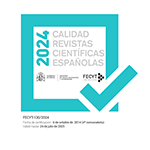"Naufragium antequam nauem ascenderem feci": shipwreck, writing, and self-exemplarity in Seneca’s Epistulae Morales
Abstract
In this article we will analise two of Seneca’s epistulae, 53 and 87, which have in common the fact of beginning with a first-singular person narrative. The complex visual dynamics that these narrationes build will play a key role in the promotion of the epistolary ego’s exemplarity, since he will make a spectacle of his uneven progress on the path to wisdom, presenting himself as actor, spectator and judge of his own actions. We claim that through these narrationes, which involve shipwreck as a literary motif, the epistolary ego actively appropriates one Roman cultural device which plays a central role in memory building, the discourse of exemplarity. Taking into account the fact that there has to be a monumentum, a record, that makes visible the deed proposed as exemplary (Roller 2004), we will try to show that by writing these letters the epistolary ego directs the reader’s attention to his own exemplarity.
Downloads
Article download
License
In order to support the global exchange of knowledge, the journal Cuadernos de Filología Clásica. Estudios latinos is allowing unrestricted access to its content as from its publication in this electronic edition, and as such it is an open-access journal. The originals published in this journal are the property of the Complutense University of Madrid and any reproduction thereof in full or in part must cite the source. All content is distributed under a Creative Commons Attribution 4.0 use and distribution licence (CC BY 4.0). This circumstance must be expressly stated in these terms where necessary. You can view the summary and the complete legal text of the licence.








